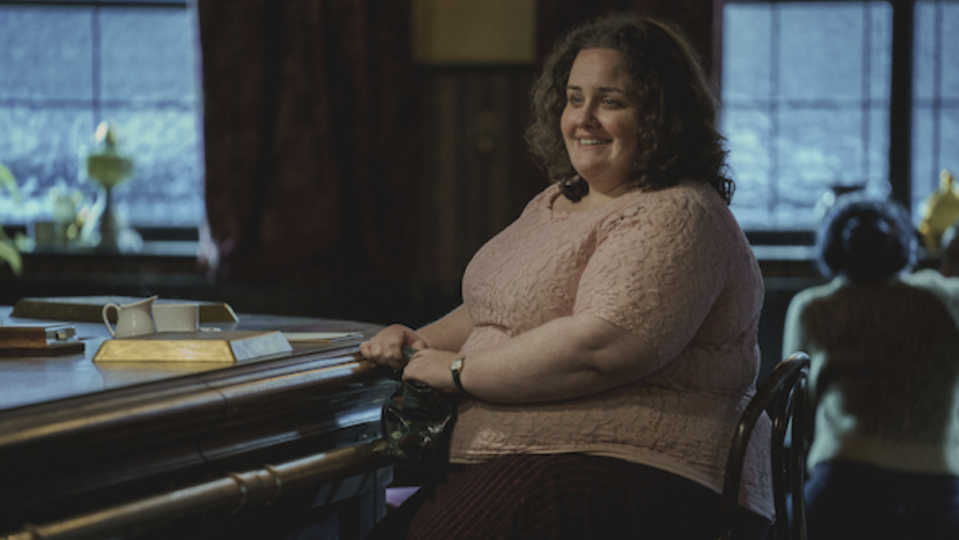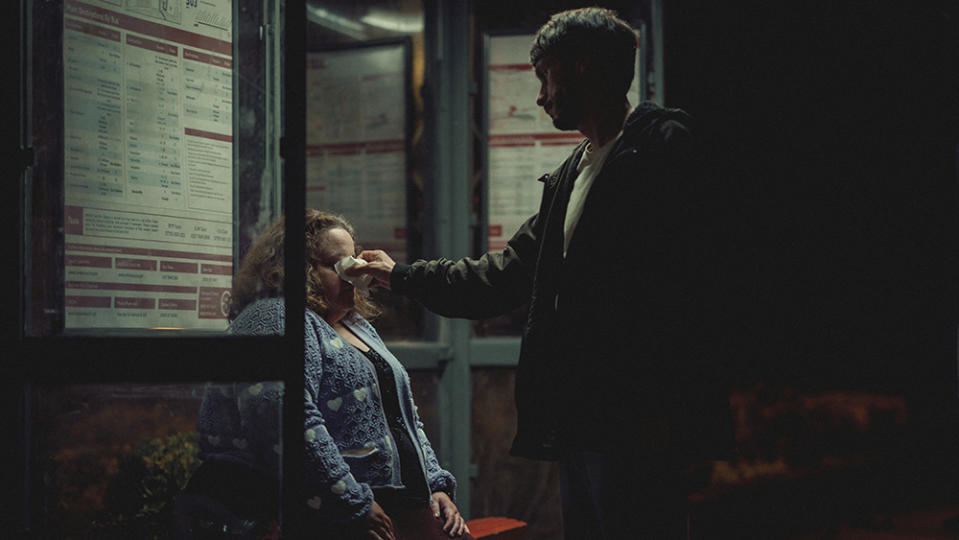‘Baby Reindeer’ Star Jessica Gunning on Why She ‘Never Saw Martha as a Villain’ and How Audiences Are ‘Hungry for Messy Stories’

“Baby Reindeer” breakout star Jessica Gunning could never have predicted the impact the British drama series would have, but she’s certain it’s making a difference for future stories and those who see themselves in the characters.
“It’s incredible to have such a universal reaction,” she tells Variety. “It shows that audiences are hungry for messy stories that aren’t black and white or neatly tied up with a happy ending. It’s more complicated than that, and people are ready to watch and handle it.”
More from Variety
The Netflix limited series has surged into the spotlight, capturing significant attention and cultural impact. Gunning has emerged as a potential frontrunner in the Emmy race for her stunning portrayal of the enigmatic stalker, Martha Scott.
In recent weeks, a Scottish woman claiming to be the inspiration for Richard Gadd’s hit series has sued the streamer, seeking at least $170 million in damages. Whether this will affect its awards prospects remains to be seen. Based on Gadd’s one-man Edinburgh Festival play, the seven-episode series follows Donny Dunn (played by Gadd), a fictionalized version of Gadd himself, as he tries to transition from barman to comedian while being stalked by Martha (Gunning), who sends him thousands of emails and harasses his family and girlfriend (Nava Mau).
On this episode of the award-winning Variety Awards Circuit Podcast, Gunning sits down to discuss her role as the lawyer-stalker Martha on the hit streaming series. She discusses the nuanced portrayal of “life’s messiness and complexity” as depicted and what roles she’ll be seeking next.
Parts of the conversation are below. Primetime Emmy nomination voting begins on June 13. Listen below!
Read: All Primetime Emmy predictions in every category on Variety’s Awards Circuit.
Note: This interview was conducted prior to the lawsuit against Netflix by the alleged real “Martha.”

How does it feel to receive the attention you and the series has garnered over the past few months?
It feels like a bit of a dream. I would never have thought it’d be like this. When I read the script, I did think it’s probably the best thing I’ve ever read. And then when I first watched the show, as a whole, I thought this could be pretty special. But I thought it would be a kind of slow burn, niche indie thing. And then suddenly, it’s just exploded, which is incredible. I’m so pleased so many people are watching it and responding to it.
How did you identify with Martha when you first read it?
I’d heard about Richard a few years before I got the script because I had seen his show, ‘Monkey See Monkey Do,’ at the Edinburgh Fringe Festival. In that show, he was on a treadmill for about an hour, telling the story about what happens in episode four. I remember thinking, ‘Wow, what a brave play and an amazing storyteller.’ I had always admired him.
When I heard about ‘Baby Reindeer,’ I tried to get tickets for the stage show, but it was sold out. So, I bought a copy of the play and read it. A little bit Martha of me [chuckles]. I was was fascinated to see how it would be adapted for TV.
When the scripts came through, I read them in one go and went to the audition, almost begging them for the part. I had never read anything like it before, and the bravery of Richard in telling this story, including episode four, and merging the two plays together, is just amazing.
What scene did you read for the audition?
Over about four months, we did four auditions. It was important for everyone at our films and Netflix to ensure the chemistry between us was right. Martha could be played in many ways, so we needed to get the dynamic between Richard and me right for the characters of Martha and Donny. We performed the cafe scene from Episode One, the zipping up scene, and later, some further scenes like the one with Terry. We aimed to get all the dynamics right because there are so many sides to the characters and so many things happen.
Seeing the show hit No. 1 on Netflix, how did that feel?
It felt so strange. I’ve been working in the UK for 17 years, since graduating from drama school in 2007. I’ve had amazing opportunities, but I’ve never been in a show with such reach. That’s the thing about Netflix—you forget how many people it reaches, something like 260 million accounts. And not everyone watches Netflix alone, so there are often more people in the room. These numbers just blow your mind. It’s incredible to have such a universal reaction. It shows that audiences are hungry for messy stories that aren’t black and white or neatly tied up with a happy ending. It’s more complicated than that, and people are ready to watch and handle it.
How do you balance your interpretation of Martha — looking at her as someone who suffers from mental illness vs. someone who wants to be loved?
When I responded so clearly to the script, I thought, ‘Oh my God, please, can I get this?’ because I saw her so vividly. Richard’s writing is amazing. He created a character I’ve never read before—nuanced, flawed, damaged, but with a strange hopefulness. She can see things in him that not many people have. When she says, ‘Somebody hurt you, didn’t they?’ it’s such an incredible, insightful observation. They find each other at a time when they need each other. She’s a bit lost and alone, and so is he. Donny admits in the show that he’s flattered by her attention and starts to compliment her back, which is when things get messy and muddled. But I never saw Martha as a villain. Early on, one of the unit drivers tried to grasp the show’s concept and said, ‘Oh, I drive two villains on this show.’ I thought he meant Tom, who plays Terry, but then I realized he meant me. I was shocked because I never saw her that way. The voicemail she leaves at the end always moved me to tears. That moment captures the essence of her character.
Did you look up or reach out to the real “Martha” up to prepare for the role?
No. I don’t know much about the person ‘Martha’ is based on because the character was so clear to me. I didn’t want to muddy that clarity or change my perception of her. Luckily, our directors, Weronika [Tofilska] and Josephine [Bornebusch], along with Richard [Gadd], felt that the balance I found for her was right. I didn’t want to complicate things by learning too much that would alter my view.
Why did you tell audiences not to look for the real Martha?
Richard has been extremely brave and open in telling this story. He’s been very honest and hasn’t painted himself as a blameless victim; he’s acknowledged his own messiness. This story is told solely through his point of view, through Donny’s eyes. When playing a character in such a narrative, you have to rely on the script. It’s an emotionally true story, but it’s only from Danny’s side. You can lose the essence if you try to look beyond that. I understand the fascination with true crime, but this story is more complicated, delicate, and nuanced. It’s important to take it as it is, as a piece of work.

Did you ever judge Richard’s actions and how he seemed to lead Martha on?
I didn’t struggle much with the character because she’s so endearing, funny, and full of contradictions. When you think you understand her, she’ll say or do something surprising. Her idea of having places to go is so sweet and harmless that it’s easy to be drawn in. One amazing moment in episode one is after the comedy show when Donny is about to accept or deny her Facebook request. He looks back at his bag of props, admitting she helped make the show better. This moment is his acknowledgment that she could be useful material, or more. His honesty about their interactions, his compliments, and flirting are all there, making it hard to judge. When she prepares for her next comedy show with him, learning more songs, she genuinely believes she made the show better. This complexity and her unpredictability are what draw you in every time.
You credited Gadd’s bravery in writing and performing this piece, especially on a topic that can be difficult for anyone to discuss publicly. What are your thoughts?
I knew he was an amazing actor and a brave storyteller, but watching episode four blew me away. He was so raw and exposed, and it must have taken a lot for him to do that. Since the show’s release, he mentioned that a UK charity he supports, We Are Survivors, has seen an 80% increase in calls from men. Sometimes, TV, film, and theater are for escape or entertainment, but occasionally a project comes along that might even change lives [Gunning’s voice begins to crack]. It’s emotional to be part of something that has such a powerful impact, making people feel seen for the first time.
After this, what kind of roles are you looking to play in the future?
Who the heck knows? I never expected any of this. Someone asked if I saw Martha as a springboard, and I genuinely didn’t. I don’t think I’ll ever get to play a part like this again; she’s the role of a lifetime. I’m open to anything. I really enjoyed doing ‘The Outlaws’ with Stephen Merchant, and we’re on season three. I was also in the writers’ room for that. I’m writing some things that might be in the pipeline, which is exciting. We’ll see what happens next. I remember working on the film ‘Pride’ with Imelda Staunton. At the end, she said, ‘If we never work again, we can say we’ve been in that film.’ I feel the same about ‘Baby Reindeer.’ If nothing else comes my way, I’m just so proud to have been part of that show.
Do you have a dream role you’d like to play?
It’s funny because in high school, we did plays for our GCSE exams, and I chose to do ‘Who’s Afraid of Virginia Woolf.’ That’s a Martha too, played by Elizabeth Taylor, which is one of my favorite roles ever. It would be amazing to play her. I love the idea of 15-year-olds with whiskey glasses trying to embody such complex characters. I saw old footage of it the other day and thought, I only want to play Marthas now.
You’re in the Emmy conversation for a nomination for supporting actress (limited). What would that feel like if you’re recognized by the Television Academy?
My God, I know it sounds like a cliché, but even being here having these kinds of chats with you is just crazy to me. I thought everyone would love the show, but hearing it mentioned alongside the Emmys is overwhelming. It’s so exciting. Being considered for a nomination is an honor. Whatever happens, I’m thrilled it has received such a great response.
This interview has been edited and condensed.
Variety’s “Awards Circuit” podcast, hosted by Clayton Davis, Jenelle Riley, Jazz Tangcay, Emily Longeretta and Michael Schneider, who also produces, is your one-stop source for lively conversations about the best in film and television. Each week, “Awards Circuit” features interviews with top film and TV talent and creatives, discussions and debates about awards races and industry headlines, and much more. Subscribe via Apple Podcasts, Stitcher, Spotify or anywhere you download podcasts. New episodes post weekly.
Best of Variety
Sign up for Variety’s Newsletter. For the latest news, follow us on Facebook, Twitter, and Instagram.

 Yahoo News
Yahoo News 
